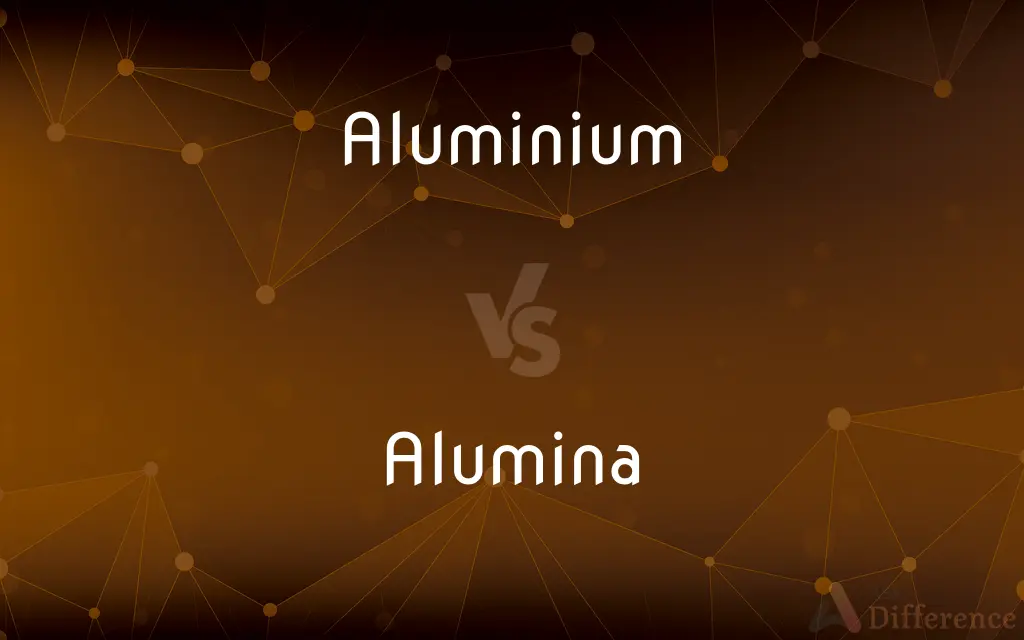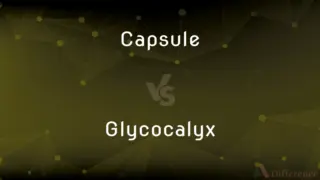Aluminium vs. Alumina — What's the Difference?
Edited by Tayyaba Rehman — By Fiza Rafique — Updated on October 1, 2023
Aluminium is a lightweight, silvery-white metallic element, while alumina, or aluminum oxide, is the oxide of aluminium, a white crystalline compound.

Difference Between Aluminium and Alumina
Table of Contents
ADVERTISEMENT
Key Differences
Aluminium and Alumina are closely related yet distinct substances. Aluminium is a chemical element, known for its malleability, conductivity, and resistance to corrosion. It is used in a wide array of industries, from aircraft manufacturing to kitchenware. Its lightweight and durable nature makes it a popular choice for various applications.
On the other hand, alumina, formally known as aluminum oxide, is a white crystalline compound that serves as the raw material for aluminium extraction. This compound is derived from bauxite ore and is the primary source from which aluminium is refined. Alumina has properties that make it valuable in its own right, especially in the ceramic industry and as an abrasive.
While aluminium is prized for its versatility as a metal, alumina is often appreciated for its hardness and high melting point. It's essential to understand that while all aluminium originates from alumina, not all alumina is used to produce aluminium. Some alumina finds its purpose in other applications.
At a glance, aluminium, with its silvery-white appearance, is distinctly metallic. Alumina, in contrast, appears as a white powder or granular material. These visual differences mirror their differing roles in industry and manufacturing.
In essence, while both aluminium and alumina play pivotal roles in various industries, they are fundamentally different in composition, appearance, and application.
ADVERTISEMENT
Comparison Chart
Composition
Metallic element
Aluminum oxide (compound)
Appearance
Silvery-white metal
White powder or granules
Uses
Aircraft, utensils, wiring
Ceramics, abrasives, aluminium production
Origin
Refined from alumina
Derived from bauxite ore
Physical Properties
Malleable, ductile, good conductor
Hard, high melting point
Compare with Definitions
Aluminium
A lightweight, corrosion-resistant metal.
The aircraft was made primarily of aluminium due to its weight advantages.
Alumina
Also utilized as an abrasive material.
Alumina abrasives are used for grinding and polishing.
Aluminium
A chemical element with symbol Al.
Aluminium foils are commonly used for packaging.
Alumina
Used in ceramics due to its hardness.
Alumina ceramics are used in engineering applications.
Aluminium
The third most abundant element in the Earth's crust.
Despite its abundance, aluminium was once more precious than gold.
Alumina
A substance with a high melting point.
Alumina can withstand extremely high temperatures.
Aluminium
A silvery-white, ductile material.
Aluminium cans are widely recycled.
Alumina
Aluminum oxide, a white crystalline compound.
Alumina is processed to extract aluminium metal.
Aluminium
A good conductor of electricity.
Aluminium wiring is found in some older homes.
Alumina
The primary source for aluminium production.
Bauxite ore is refined to produce alumina.
Aluminium
Variant of aluminum.
Alumina
Any of several forms of aluminum oxide, Al2O3, occurring naturally as corundum, in a hydrated form in bauxite, and with various impurities as ruby, sapphire, and emery, used in aluminum production and in abrasives, refractories, ceramics, and electrical insulation. Also called aluminum oxide.
Aluminium
A light, silvery metal extracted from bauxite, and a chemical element (symbol Al) with an atomic number of 13.
Alumina
Aluminum oxide, especially when used in mining, material sciences or ceramics.
Aluminium
(countable) A single atom of this element.
Alumina
One of the earths, consisting of two parts of aluminium and three of oxygen, Al2O3.
Aluminium
(slang) Aircraft or other machinery made partially or wholly of aluminium.
Alumina
Any of various forms of aluminum oxide occurring naturally as corundum
Aluminium
Same as aluminum, chiefly British in usage.
Aluminium
A silvery ductile metallic element found primarily in bauxite
Common Curiosities
Which is heavier, aluminium or alumina?
Alumina is denser and heavier than aluminium.
Can alumina be used directly in manufacturing like aluminium?
Not in the same way; while alumina is used in ceramics and as an abrasive, aluminium is used in a myriad of structural applications.
Is alumina a metal like aluminium?
No, alumina is a crystalline compound, not a metal.
Is there aluminium in our daily products?
Yes, from soda cans to cooking foil, aluminium is widely used.
Is aluminium derived from alumina?
Yes, aluminium is refined from alumina.
Why is alumina used in ceramics?
Due to its hardness and heat resistance.
Can alumina be found in skincare products?
Yes, it's sometimes used as an abrasive or thickening agent.
Which is more expensive, aluminium or alumina?
Prices fluctuate, but generally, processed aluminium is more expensive than alumina.
What's the main ore from which alumina is derived?
Bauxite.
How is alumina converted into aluminium?
Through an electrolytic process called the Hall-Héroult process.
Can both aluminium and alumina be recycled?
Aluminium is highly recyclable. Alumina isn't typically recycled in the same manner.
Is aluminium naturally occurring?
While aluminium itself is not found free in nature, its compounds like alumina are.
Are there environmental concerns with aluminium production?
Yes, refining alumina to aluminium is energy-intensive and has environmental implications.
Are there any health concerns associated with alumina?
Inhalation of fine alumina dust can be harmful, but in most applications, it poses minimal health risks.
Share Your Discovery

Previous Comparison
Clam vs. Oyster
Next Comparison
Capsule vs. GlycocalyxAuthor Spotlight
Written by
Fiza RafiqueFiza Rafique is a skilled content writer at AskDifference.com, where she meticulously refines and enhances written pieces. Drawing from her vast editorial expertise, Fiza ensures clarity, accuracy, and precision in every article. Passionate about language, she continually seeks to elevate the quality of content for readers worldwide.
Edited by
Tayyaba RehmanTayyaba Rehman is a distinguished writer, currently serving as a primary contributor to askdifference.com. As a researcher in semantics and etymology, Tayyaba's passion for the complexity of languages and their distinctions has found a perfect home on the platform. Tayyaba delves into the intricacies of language, distinguishing between commonly confused words and phrases, thereby providing clarity for readers worldwide.














































